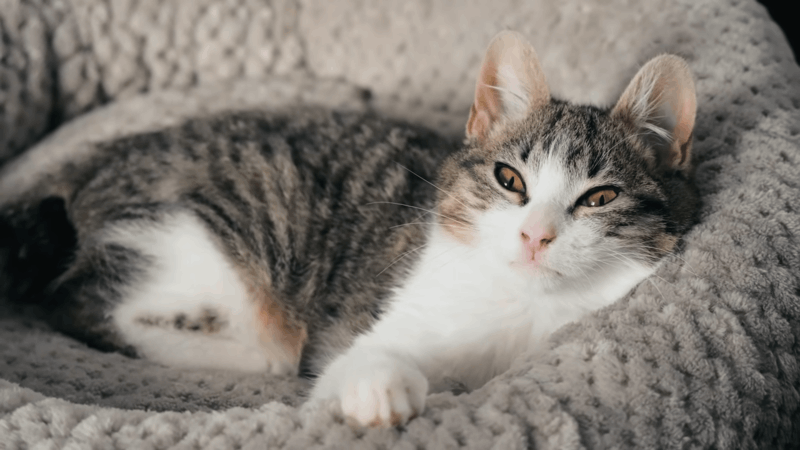No products in the cart.
Can cats have Benadryl? This is a question many cat owners ask when their furry friends suffer from allergies or motion sickness. Benadryl, a common household antihistamine, can indeed be used for cats under the right circumstances.
The benefits, proper dosage, and potential side effects of using Benadryl for your feline companion will be uncovered in this blog. Learn how this common remedy can benefit your cat’s daily care regimen.
Benadryl for Cats and What You Need to Know

Benadryl (also known as diphenhydramine) can be used to treat allergies in cats and it is a common antihistamine. Allergic reactions to food, insect bites, or environmental triggers that cause symptoms like itching, swelling, and sneezing will be assisted by it. Benadryl can be effective, however, to ensure the correct dosage and monitor for any adverse effects, introducing it to cats under veterinary guidance is crucial.
How Long Does Benadryl Take to Work in Cats?
When administered to cats, Benadryl typically begins to take effect within 30 minutes. The cat’s size, age, and overall health are the factors that can make this timing change. Monitoring your cats during this period is so important, it can ensure they respond well to the medication and watch for any potential side effects.
Benadryl Dose for Cats
The recommended dose of Benadryl for cats is generally 1 mg per pound of body weight, given two to three times a day. Individual needs and health conditions are various so it is essential to consult with a veterinarian to determine the exact dosage suitable for your specific cat. To prevent accidental over- or underdosing, accurate dosing is essential.
Benadryl for Cats Side Effects
When administering Benadryl to cats, it’s important to be aware of potential side effects. Here are some of the common and more severe reactions that we should consider:
- Drowsiness: The most typical adverse impact is this one. Cats may appear more lethargic and sleep more than usual.
- Dry mouth: You might notice your cat drinking more water than usual or having difficulty swallowing.
- Urinary retention: Some cats may experience difficulty urinating or reduced frequency of urination.
- Rapid breathing: Increased respiratory rate or shortness of breath can occur, which should be closely monitored.
- Vomiting: Gastrointestinal upset, leading to vomiting, can be a side effect. Make sure your cat can reach their litter box and has access to lots of water.
- Diarrhea: Similar to vomiting, diarrhea can occur, indicating gastrointestinal irritation.
- Excitability: In some cases, rather than drowsiness, cats may exhibit signs of hyperactivity or restlessness.
- Loss of appetite: Some cats may eat less than usual or refuse food.
- Allergic reactions: Ironically, while treating allergies, some cats might develop an allergic reaction to Benadryl itself, presenting symptoms like swelling, hives, or severe itching.
- Severe reactions: Though rare, severe reactions can include seizures, extreme lethargy, or collapse. Veterinarian care must be given for these symptoms right away.
Monitoring your cat closely after administering Benadryl is crucial. If you notice any of these side effects, particularly the more severe ones, consulting with your veterinarian is advised. They can provide guidance on keeping, stopping the medication or adjusting the dosage.
What Does Benadryl Do for Cats?

People with allergies can often benefit from using Benadryl, also known as diphenhydramine, an over-the-counter antihistamine. Under veterinary guidance, it can be safely used in cats. Allergic reactions and their accompanying symptoms can be lessened by this medication when blocking histamine receptors.
Benefits of Benadryl for Cats:
- Reduces itching and scratching: Helps alleviate itching caused by allergies, preventing excessive scratching and potential skin infections.
- Decreases swelling: Minimizes swelling from allergic reactions, such as those caused by insect bites or environmental allergens.
- Alleviates motion sickness: It is useful for easing motion sickness symptoms when traveling.
- Calms anxiety: Acts as a mild sedative, which can help calm anxious cats in stressful situations.
- Treats mild allergic reactions: Effective in managing minor allergic reactions to food or other allergens.
Benadryl for Cat Allergies
Various allergic reactions in cats, including those caused by food, insect bites, and environmental allergens can be treated by Benadryl. It helps lessen the appearance of symptoms like hives, itching, and facial swelling. Benadryl can improve your cat’s comfort and prevent further complications like skin infections due to excessive scratching by minimizing these reactions.
Can Cats Take Benadryl for Sneezing?
If a cat sneezes because they are allergic, Benadryl can help them. Sneezing and nasal discomfort are caused by a histamine reaction that is diminished by it. The sneezing is allergy-related and not due to an infection or other underlying health issues, so it can require different treatments.
Can I Give My Cat Benadryl for Pain?
Benadryl is not typically used as a pain reliever for cats. It can provide some relief from discomfort associated with allergies, however, it is not effective for managing pain from injuries, surgeries, or chronic conditions. To find appropriate and effective medications specifically designed to address your cat’s pain, getting advice from your veterinarian is essential.
Can Cats Have Benadryl?

Yes, cats can have Benadryl. Cats’ motion sickness, allergies, and itching are the common diseases that are cured by it. When taken as directed, Benadryl helps block histamine receptors, thereby lowering the symptoms and allergic reactions associated with them.
To guarantee safety and efficacy, delivering the correct dosage based on the cat’s weight is the key that we should consider. Always start with a low dose and observe how your cat responds to the medication.
Is Benadryl Safe for Cats?
Benadryl is generally safe for cats when used properly. Symptoms of allergies like itching and swelling and motion sickness during travel can be managed by it. Benadryl works well for minor illness and allergies, however, you should keep an eye out for potential adverse effects in your cats and if you observe any unusual behavior or symptoms, contact your veterinarian as soon as possible.
Can I Give My Cat Children’s Benadryl?
Yes, you can give your cat Children’s Benadryl, especially the liquid form, which makes it easier to measure and administer the correct dose. The dosage should be calculated based on your cat’s weight to ensure accuracy. Children’s Benadryl is formulated to be milder, making it a suitable option for pets.
To protect cats, use only versions that contain diphenhydramine and stay away from formulations that include other active components like acetaminophen or decongestants.
Conclusion
Can cats have Benadryl? Absolutely, when used correctly, Benadryl can help manage your cat’s allergies and motion sickness. Recognizing the right dosage and potential side effects is so important. Always consult your vet before administering it to ensure your cat’s safety. With careful administration, this common antihistamine can become a helpful addition to your cat care routine, keeping your feline friend comfortable and healthy.
Hello, I am Hazel Bennett, an experienced copywriter specializing in the fascinating topic of CBD for dogs. With a passion for pet wellness and extensive knowledge of CBD’s potential benefits, I am here to provide you with informative and engaging content.



